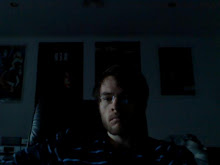skip to main |
skip to sidebar
Ross Douthat Is Wrong and Right
Here is an odd, half-year-old post on the great The Wire from the New York Times’ youngest op-ed man. Although Douthat shares with David Simon an evident sad anger at the decline of America’s (or Baltimore’s) print journalism, it seems he doesn’t approve of how The Wire’s fifth season addresses it. Douthat would rather Simon had stepped back in both emotional and narrative terms from the experience on which we know he drew in making the series. He wants the whole equation or a wholer one.
(Now there is a complication here in that I cannot really tell from the post whether Douthat would prefer that such a retreat be made in the service of jeremiad or of elegy. Does he want Simon gaily to gloss over the compound fracture as if it were a matter of quick setting, or to broaden an already sincere analysis, hairline crack at a time? This I will overlook.)
My rejoinder is simple. I don’t think realism works like that. Assuming that The Wire is realist and realistic art, to wish Simon would give a dissertation-level retelling of the papers’ decline is to wish he would take on the role of a theoretician, as against that of a practising maker of television. Is it not clear that representation must compress? These are ancient trade-offs: the programme will gain in pungency what it loses in comprehensiveness; the selected detail will stand for many but necessarily not most; the narrative will falsify, and falsify more at the margins, as it works the diffusion of life into a coherence that compels; and ethics, vitally a matter of case after individual case, of nuance and texture, as brought to bear upon a scenario prepared already and to different ends will seem less a set of pre-articulate principles (as variously applicable as the variety of minds that entertain them) than an instrument of a streamlining dictatorial intelligence. The trade-off in art is between fact and value, roughly: such a unifying/ intelligence has to decide which bits of irreducible reality to cast off or underplay in shaping an efficient vector of delivery for the finite attention of an audience. Accordingly as it has a dogma it wants to push — and Douthat is insinuating that Simon does — it will shift emphasis between the value-informed, hierarchic sorting of reality and the value-determined, aesthetic shaping of the results: that is, the dogmatic writer will not pay critical due to elisions of fact, being glad of his settled outlook, and where the less dogmatic writer prunes conscientiously he will present arrestingly the facts he picks out he got going with. Douthat’s criticism falters on this ground. While he claims to want, so to speak, portrait rather than landscape footage, he shows his dissatisfaction with the segment of the landscape that Simon zoomed in on as a representative one. But Simon, in his turn, believed this story that ‘really happened’ was a representative story — for one thing, I’d guess, for the way its details resonated with the theme of lies and their terrible prestige. In gesturing to the false exit of a realism that is not art, Douthat betrays the art of his own commentary, which has been to force an inadequate aesthetics into a predetermined frame. Simon’s priorities in season 5 of The Wire may well be clear, but, in criticising the work in formal terms, the critic should say how he believes a differently trimmed reality, specified by him, would have represented better the less trimmed reality we can sometimes see. In so doing, it is true, he will have stumbled his way into a thicket where it becomes apparent that the variability of ‘priorities’ from person to person is a more intractable problem that it had seemed from his armchair: nevertheless these are the terms that he set for himself. The exercise would certainly not be futile. It might in fact constitute what Geoffrey Hill has called, in different context, an ‘exemplary failure’. For through that stumbling Douthat could, would have to, submit his ‘conservative’ premises to the same second looks and same testings against fact to which Simon had to submit his (of whatever liberal stripe) when he depicted with such ruthless clarity — this clarity enmeshed of course with a sentimentality that both softens and fuels it — the death of a thing he loved.




No comments:
Post a Comment